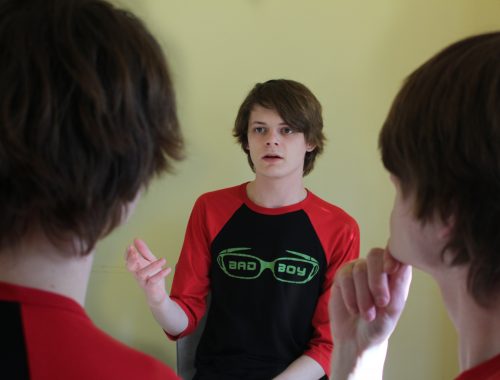AEL 3001 Blog Post 2
Getting ready for a job interview can undoubtedly be a rather intense time in any professional’s life: whether it is the question preparation or the willingness to create a good rapport with your potential future employer, a lot is arguably at stake. As such, I have found the conducting of the simulated interview most effective in preparing for post-graduation interviews, as well as reflecting on that process. Peter Tarrant notes how through reflection “we become more aware, more in control, more able to see our strengths and development needs.” (2) In conjunction with this, I will be using Gibbs’ model of reflection to analyse my preparation for being interviewer and interviewee, as well as my thoughts and feelings during the procedure itself.

My Role as Interviewee
The process began when I decided to look for a post that I felt interested me. I initially looked for broadcasting positions in and around Belfast, but could not see anything that necessarily appealed to me, so I expanded my search to a UK wide one, and came across ‘Assistant and Programme Co-ordinator’ for the Comedy department at Channel 4. Being a fan of Channel 4’s work, I felt that this would be an intriguing position, as it involves a lot of organisational work and tracking projects from pre to post production, something I have garnered good experience in in recent years (particularly through experience of the full commissioning process). I researched Channel 4 as a whole, to gain a greater understanding of their commissioning process, aims and company mission, as well as why they recruit the people that they do. One thing that inspired me the most about Channel 4’s recruitment process was their willingness for diversity and representation within their cast and crew, and as such I wanted to weave my passion for this aspect into my preparation.
John Lees analyses how too many candidates “believe that interview success is more about luck than preparation. They are right, but only in the sense that we manage part of our luck.” (1) I struggled knowing exactly what to prepare, as the interviewers could ask any number of questions in several different ways, but I felt the best way to avoid any hesitation during the interview was to cover as many bases as I could. I tried to think of applicable situations regarding the STAR technique (situation, task, action, result) – including times for example where I showed good leadership, my strengths and weaknesses, or where I had to solve a problem under pressure etc. Although some of the practical examples I could conjure up did not always necessarily relate to the type of work I would be doing, I considered the importance of problem solving in any respect. I tried to contemplate how the interview process and my answering these questions was not an interrogation by any means, but rather how, as Rogers states, “the interview is a meeting of equals and that you are choosing them as much as they are choosing you,” and upon recognition of this, “many of the problems fade away.” (93)

Nonverbal communication is a large part of the interview process, so I took note of several of those key aspects throughout the procedure, like dress code, posture and body language. I tried to maintain eye contact with all interviewers and keep an open body language in both my role as interviewer and interviewee, and was quite pleased with how the interview itself went. I was the final member of my group to be interviewed, so I had time to settle myself and gain a sense of what the process was going to look like. I tried to provide efficient examples relating to the question (which was rather challenging amidst the actual situation itself). However, I felt somewhat nervous before the interview, and although I believe that I prepared well, I found I did have a tendency to ramble and felt that I could have kept some of these answers more concise. Although an interview is your opportunity to tell an employer what you’ve accomplished in the past and how you’ll help them in the future, (Padmanabha Rao 116) my feedback noted how I could have perhaps been more “engaging when speaking”, so I have taken note of this for next time I go to such an interview and will try to ensure more persuasive choice of language.
It is a professional interaction, which goes beyond the spontaneous exchange of views as in everyday conversation, and becomes a careful questioning and listening approach with the purpose of obtaining thoroughly tested knowledge. (Brinkmann et. al 9)
My Role as Interviewer
I have never acted as an employer/interviewer before, so I studied each person’s job description and tried to ask myself several questions such as “What qualities would an ideal candidate for this job possess?” and “how does any previous experience they have match this job?” I found it quite tough to separate my view of my classmates from their role as interviewee, but I tried to disengage emotionally to ensure every candidate got the same treatment. Stepping into the shoes of the interviewer also gave me an opportunity to look at the procedure from both sides of the table, and each process in turn effectively informed the other.
In conclusion, I found this simulated interview process to be very much worthwhile, and that it will have a positive effect on future interviews I may have.
Works Cited
Brinkmann, Svend, and Steinar Kvale. “Introduction To Interview Research.” Doing Interviews, SAGE, 2018, pp. 1–13.
Gibbs, Graham. Learning by Doing: A Guide to Teaching and Learning Methods. FEU, 1988.
Lees, John. “The Interview Game: Getting Started.” Job Interviews: Top Answers to Tough Questions, McGraw-Hill Education, 2012, pp. 1–9.
Padmanabha Rao, R.A. “Interview Process.” Job Interview, Gyan Publishing House, 2011, pp. 111-154.
Rogers, Jenny. “When Your Body Does the Talking.” Job Interview Success: Be Your Own Coach, McGraw-Hill Education, 2011, pp. 91–103.
Tarrant, Peter. “What is Reflective Practice?” Reflective Practice and Professional Development, SAGE Publications, pp. 1-18.
It Just Has to be Done

Simulated Interrogation
You May Also Like

So You Want To Be A Teacher?
17 February 2022
Shocker, Tom also sucks at interviews!
18 February 2022
